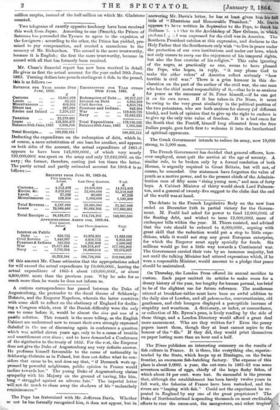The Pope has fraternized with Mr. Jefferson Davis. Whether or
not he has formally recognized him, it does not appear, but in
answering Mr. Davis's letter, he has at least given him his fa title of " Illustrious and Honourable President." Mr. Davis appears ti have written in September to the Pope, to thank his A I qter to the Archbishop of New Orleans, in which profotm g f was expressed for the civil war in America. The Southern President catches at this expression, and declares to the Holy Father that the Southerners only wish " to live in peace under the protection of our own institutions and under our laws, which not only ensure to every one the enjoyment of his temporal rights, but also the free exercise of his religion." This calm ignoring of the negro, as practically no one, seems to have pleased the Pope, who hopes, in reply, " it may please God to make the other rulers" of America reflect seriously "how terrible is civil war." There is a grim humour in this de- claration on the part of the author of the civil war, the one man who has the chief moral responsibility of it,—that he is as anxious for peace as the successor of St. Peter himself,—if he can get it on his own terms. If it has taken-in Pio Nono, it must be owing to the very great similarity in the political position of the two potentates, who are both anxious for slavery (of different kinds), and both of opinion that to give up the right to enslave is to give up the only true value of freedom. It is a bad omen for the South that the Pontiff, himself long alienated from the free Italian people, goes forth first to welcome it into the brotherhood of spiritual oppressors.
















































 Previous page
Previous page